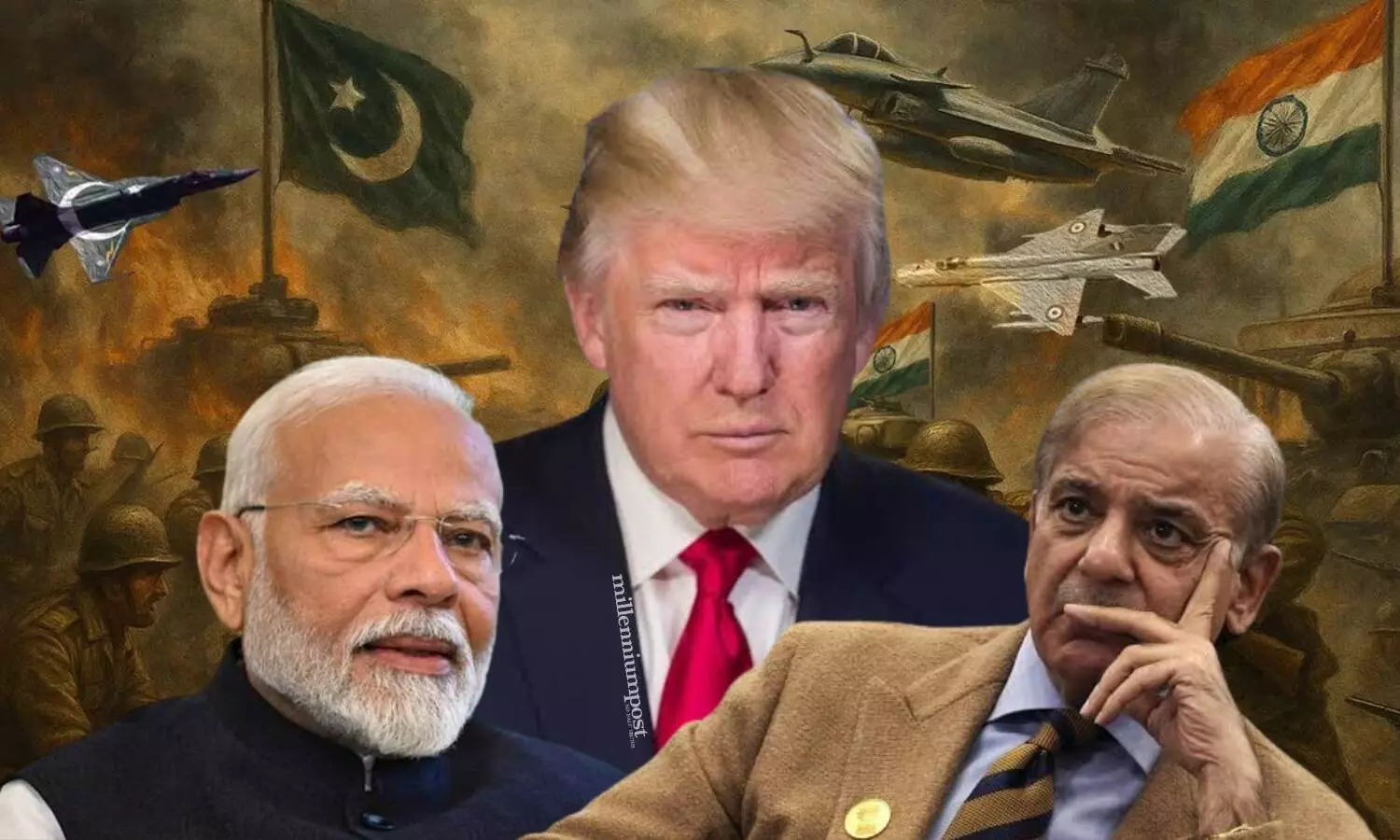Trump makes U-turn, says 2 leaders of India-Pak 'decided' to stop conflict

New York/Washington: US President Donald Trump said the two “very smart” leaders of India and Pakistan “decided” not to continue a war that could have turned nuclear, a first in weeks he did not claim credit for stopping hostilities between the two neighbouring nations. Trump made the remarks while speaking to the media in the Oval Office after hosting Pakistan's Chief of Army Staff Field Marshal Asim Munir for lunch at the White House on Wednesday. Trump said he was “honoured” to meet Munir. When asked if Iran was discussed in his meeting with Munir, Trump said: “Well, they know Iran very well, better than most, and they're not happy about anything. It's not that they're bad with Israel. They know them both, actually, but they probably, maybe they know Iran better, but they see what's going on, and he agreed with me.” “The reason I had him here, I want to thank him for not going into the war, ending the war. And I want to thank, as you know, Prime Minister Modi just left a little while ago, and we're working on a trade deal with India. We're working on a trade deal with Pakistan,” the president said. “They were both here, but I was with Modi a few weeks ago. He was here actually, but now we speak to him. And I'm so happy that two smart people, plus you know, people on their staff too, but two smart people, two very smart people decided not to keep going with that war. That could have been a nuclear war. Those are two nuclear powers, big ones, big, big nuclear powers, and they decided that.”
This is the first time in weeks that Trump did not take credit for stopping the military conflict after India launched Operation Sindoor and destroyed terror infrastructure in Pakistan controlled areas following the April 22 Pahalgam terror attack that claimed 26 lives. Since May 10, when India and Pakistan decided to stop the military conflict, Trump has repeatedly claimed on multiple occasions that he “helped settle” tensions between the two countries and that he told the nuclear-armed South Asian neighbours that America would do a “lot of trade” with them if they stopped the conflict. In Islamabad, the Pakistan army on Thursday said President Trump was accompanied by Secretary of State Senator Marco Rubio, and Steve Witkoff, the US Special Representative for Middle Eastern Affairs. Munir was joined by Pakistan’s National Security Advisor, Lt Gen Asim Malik, who is also the head of the intelligence agency, ISI at the meeting, which it said was initially scheduled for one hour but extended for over two hours, the Army said in a statement. The discussions between the two encompassed avenues for expanding bilateral cooperation in multiple domains including trade, economic development, mines and minerals, artificial intelligence, energy, cryptocurrency, and emerging technologies, it said. “President Trump expressed keen interest in forging a mutually beneficial trade partnership with Pakistan based on long-term strategic convergence and shared interests,” the army said. The Chief of Army Staff also conveyed “the deep appreciation of the government and people of Pakistan” for President Trump’s “constructive and result-oriented role in facilitating a ceasefire between Pakistan and India in the recent regional crisis,” it said. Munir also extended an invitation to Trump to visit Pakistan at a mutually convenient date.
A day before lunch with Munir, Modi and Trump were scheduled to meet on the sidelines of the G7 Leaders’ Summit in Kananaskis, Canada, but the American president returned to Washington early. Before departing Kananaskis and wrapping up his first visit to Canada in a decade, Modi had a 35-minute phone conversation with Trump. Foreign Secretary Vikram Misri, in a video message from Kananaskis, said Modi conveyed to Trump that at “no point” during Operation Sindoor was there any discussion, at any level, on an India-US trade deal or any proposal for mediation by the US between India and Pakistan. The discussion to cease military action took place directly between India and Pakistan through the existing channels of communication between the two armed forces, and it was initiated at Islamabad's request. Modi firmly said India will never accept the mediation of a third party, and there is complete political consensus in India on this matter, Misri said. The phone call on Tuesday in Kananaskis was the “first conversation” between the two leaders since April. Misri said Trump listened carefully to the points conveyed by the prime minister and expressed his support towards India’s fight against terrorism. Trump had enquired if Modi could stop over in the US on his way back from Canada, but Misri said that due to prior commitments, Modi expressed his inability to visit Washington. The prime minister was scheduled to depart for Croatia, the last leg of his three-nation tour that began in Cyprus. Earlier on Wednesday, Trump said he spoke to Modi, who he called “a fantastic man”, and stressed the two countries will have a trade deal while repeating his claim that he stopped a war between India and Pakistan. Trump was asked what he was looking to achieve diplomatically from the meeting with Munir. “This man was extremely influential in stopping it from the Pakistan side,” Trump said, referring to the army chief. After India launched Operation Sindoor on May 7 followed by on-ground hostilities for four days. India and Pakistan reached an understanding on May 10 to end the conflict after four days of intense cross-border drone and missile strikes.



